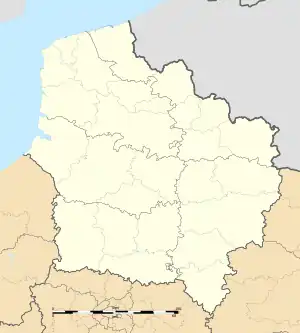Hébuterne | |
|---|---|
 The church of Hébuterne | |
 Coat of arms | |
Location of Hébuterne | |
 Hébuterne  Hébuterne | |
| Coordinates: 50°07′34″N 2°38′11″E / 50.1261°N 2.6364°E | |
| Country | France |
| Region | Hauts-de-France |
| Department | Pas-de-Calais |
| Arrondissement | Arras |
| Canton | Avesnes-le-Comte |
| Intercommunality | CC Sud-Artois |
| Government | |
| • Mayor (2020–2026) | Denis Caron[1] |
| Area 1 | 11.04 km2 (4.26 sq mi) |
| Population | 521 |
| • Density | 47/km2 (120/sq mi) |
| Time zone | UTC+01:00 (CET) |
| • Summer (DST) | UTC+02:00 (CEST) |
| INSEE/Postal code | 62422 /62111 |
| Elevation | 114–156 m (374–512 ft) (avg. 144 m or 472 ft) |
| 1 French Land Register data, which excludes lakes, ponds, glaciers > 1 km2 (0.386 sq mi or 247 acres) and river estuaries. | |
Hébuterne (French pronunciation: [ebytɛʁn]) is a commune in the Pas-de-Calais department in the Hauts-de-France region of France.[3]
Geography
A farming village situated 24 kilometres (15 miles) southwest of Arras, at the junction of the D27 and the D28 roads.
History
Formerly within the ancient county of Artois, the village was redesignated within the new Department of the Pas de Calais after the French Revolution.
First World War

For most of the First World War, Hébuterne was in the front line of the Western Front and occupied by the Allied Forces entrenched on the eastern side of the village facing the Imperial German Army 800 yards beyond occupying the village of Gommecourt. In mid-summer 1916, the 56th (London) Division of the British Army carried out an attack from Hébuterne in an attempt to capture Gommecourt as a part of the Battle of the Somme offensive, which failed with severe losses.
By the war's end, the village was a complete wreck due to the violence to which it had been subject during its front line career, and it had to be completely re-built in the 1920s.
Places of interest
- The church of St Vaast, rebuilt, as was most of the village, after the First World War.
- The Commonwealth War Graves Commission cemetery.
Population
| Year | Pop. | ±% p.a. |
|---|---|---|
| 1968 | 575 | — |
| 1975 | 516 | −1.53% |
| 1982 | 486 | −0.85% |
| 1990 | 456 | −0.79% |
| 1999 | 465 | +0.22% |
| 2007 | 542 | +1.93% |
| 2012 | 517 | −0.94% |
| 2017 | 524 | +0.27% |
| Source: INSEE[4] | ||
See also
References
- ↑ "Répertoire national des élus: les maires" (in French). data.gouv.fr, Plateforme ouverte des données publiques françaises. 13 September 2022.
- ↑ "Populations légales 2021". The National Institute of Statistics and Economic Studies. 28 December 2023.
- ↑ INSEE commune file
- ↑ Population en historique depuis 1968, INSEE
External links